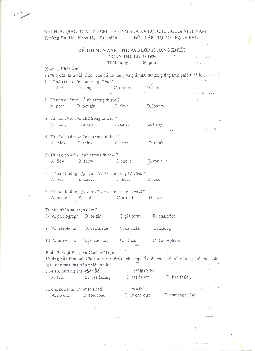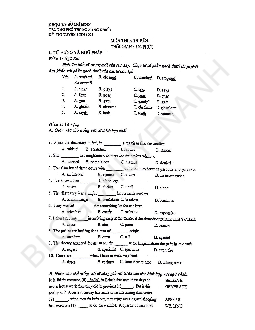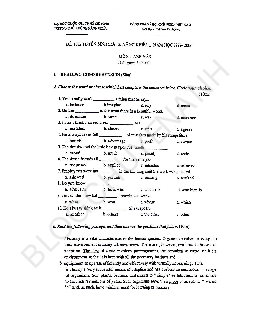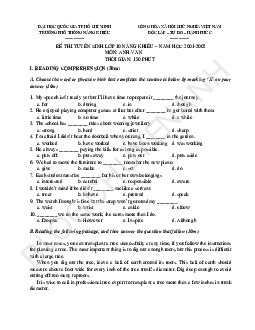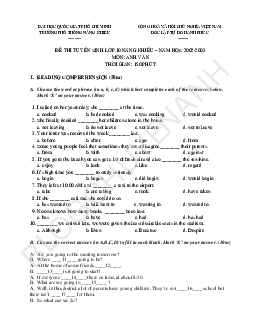






Preview text:
SỞ THÁI BÌNH
Mark the letter A, B, C, or D to indicate the word whose underlined part differs from the
other three in pronunciation in each of the following questions.
Question 1. A. visited B. suffered C. installed D. informed A. ˈvɪzɪtɪd B. ˈsʌfɚrd C. ɪnˈstɑːld D. ɪnˈfɔːrmd
Question 2. A. web B. climb C. doubt D. comb A.web B.klaɪm C. daʊt D. koʊm
Question 3. A. tide B. bill C. pipe D. smile A. taɪd B. bɪl C. paɪp D. smaɪl
Question 4. A. teacher B. children C. machine D. chicken A.ˈtiːtʃɚr B.ˈtʃɪldrən C. məˈʃiːn D. ˈtʃɪkɪn
Question 5. A. goes B. watches C. dishes D. passes A. ɡoʊz B. wɑːtʃɪz C. ˈdɪʃɪz D. pæsɪz
Mark the letter A, B, C or D on your answer sheet to indicate the correct answer to each of the following questions.
Question 6. Monica enjoys ________ fashion shows on television. A. watch B. watched C. watching D. to watch ●
Enjoy doing smt: thích làm gì
Question 7. The students hope ________the exams with flying colors. A. passing B. to pass C. pass D. passed ●
Hope to do smt: hi vọng làm gì ●
Pass something with flying colours : Vượt qua, đặc biệt trong học tập, dễ dàng với thành quả lớn và rõ rệt.
Question 8. Mary has got excellent academic performance, ________she will receive the scholarship. A. so B. however C. but D. and ● So: do đó ● However: tuy nhên ● But: nhưng ● And: và
Question 9. I often ask my sister to ________ the children while I am away on business. A. look for B. go on C. turn on D. look after ●
look for (phr verb): tìm kiếm ● go on (phr verb): tiếp tục ●
turn on (phr verb): mở, bật ( TV, máy lạnh, đèn…) ●
look after (phr verb): chăm nom, chăm sóc
Question 10. Wind energy is clean and safe because it does not cause ________. A. deforestation B. solution C. destruction D. pollution ●
deforestation /di¸fɔris´teiʃən/ (n): Sự phá rừng; sự phát quang ●
solution /sə'lu:ʃn/ (n): Sự giải quyết; giải pháp, cách giải quyết ●
Destruction /dis'trʌk∫n/ (n): Sự phá hoại, sự phá huỷ, sự tiêu diệt; tình trạng bị tàn phá,
tình trạng bị tiêu diệt ●
Pollution /pəˈluʃən/ (n): Sự ô nhiễm, sự làm nhơ bẩn (nước...); chất làm ô nhiễm, chất làm nhơ bẩn
Question 11. Reading books ________ good for your mind. A. is B. have been D. are D. were
Question 12. English is spoken in many countries all over ________ world. A. the B. a C. an D. no article
● “the” đứng trước những sự vật mang tính độc đáo, duy nhất
Question 13. Mai received a lot of gifts ________ her 15th birthday. A. in B. from C. at D. on ●
Giới từ “on” chỉ các khoảng thời gian cụ thể , như là các thứ trong tuần, ngày tháng cụ
thể và vào các ngày lễ cụ thể có chứa từ “day”.
Question 14. My brother ________ to learn English three years ago. A. started B. has started C. starts D. will start
Question 15. She felt ________ after working for 8 hours no-stop. A. exhaust B. exhaustedly C. exhausted D. exhausting ●
Exhaust /ɪgˈzɔst/ (v): Làm kiệt quệ, làm rỗng, làm cạn; dốc hết, dùng hết ●
Exhausted /ig´zɔ:stid/ (a): Kiệt sức, mệt lử ● no-stop (n): không ngừng
Question 16. We wish the weather ________ better now. A. is B. were C. will be D. had been ●
Câu ước: S + wish(es) + (that) + S + V-ed/were/p2
Question 17. In my class, English ________ by Mrs. Smith twice a week. A. taught B. teaches C. is taught D. teach ●
Cấu trúc câu bị động: S + be( chia) + V3/ed + by 0 ( S:đối tượng bị tác động bởi hành động)
Question 18. Linh’s mother advised her to ________ a course in cooking traditional food. A. have B. make C. do D. get ●
Advise sbd to do smt: khuyên ai làm gì
Question 19. I will never forget the day ________ we first met. A. which B. when C. that D. where ●
Trạng từ quan hệ “when” thay thế cho “the day”
Question 20. When visiting Viet Nam, foreign visitors like to buy ________ sculptures as souvenirs. A. nice small wooden B. small nice wooden C. small wooden nice D. nice wooden small ●
Trật tự tính từ: OASCOMP
Question 21. Children should be taught how to use electronics to learn ________. A. effectively B. effect C. affect D. effective ●
effect /i'fekt/ (N): Hiệu lực, hiệu quả, tác dụng ●
affect /ə'fekt/ (v): Làm ảnh hưởng đến, làm tác động đến; chạm đến ●
Effective /'ifektiv/ (a): Có hiệu lực, có kết quả ●
Effectively /i'fektivli/ (adv): Có hiệu lực, có hiệu quả, có ích
Question 22. If I ________ enough money. I will take a space trip with scientists. A. don’t have B. didn’t have C. had D. have ●
Cấu trúc câu điều kiện loại 1: if + S + V (simple present), S + will/can/shall + V
Question 23. Ba is taller than his brother, ________? A. isn’t Ba B. isn’t he C. is he D. is Ba ●
Cấu trúc câu hỏi đuôi: đông từ chính “is” --> isn’t she
Question 24. Nguyen Du is one of the most brilliant poets in Vietnamese________. A. history B. mathematics C. literature D. geography ●
History /´histri/ (n): Sử, sử học, lịch sử ●
mathematics/,mæθi'mætiks/(n):Môn toán, toán học ●
literature /ˈlɪtərɪtʃə/ (n): Văn chương, văn học ●
Geography /dʒi´ɔgrəfi/ (n)K: hoa địa lý; địa lý học
Question 25. ________ the Internet is very useful and convenient, it sometimes cause troubles to users. A. Because B. In spite of C. Although D. Because of ●
because of + noun = because + clause : bởi vì ●
although + clause = despite + noun : mặc dù
Question 26. Bring along with you umbrella. It ________ rain when you come back. A. might B. should C. need D. must ● might : có thể ● should : nên ● Need : cần ● Must : phải
Mark the letter A, B, C or D on your answer sheet to indicate the word(s) CLOSEST in
meaning to the underlined word(s) in each of the following questions.
Question 27. Nowadays, homes consume much more energy than they used to. A. use B. save C. spend D. produce ●
Consume /kənˈsum/ = use (v): Dùng, tiêu thụ ●
save (v):Dành dụm, tiết kiệm (tiền); giữ lại, để dành ●
spend (v): Tiêu, chi tiêu (tiền) ●
Produce /prɔ'dju:s/ (v): sản xuất
Question 28. Do you agree that hard work essential to the success of an English learners? A. important B. interesting C. easy D. complicated ●
Essential /ɪˈsenʃəl/ = important / ɪmˈpɔːrtənt/ (a): quan trọng ●
Interesting /ˈɪntrɪstɪŋ/ (a): thú vị, hấp dẫn ● Easy / ˈiːzi/(a): dễ dàng ●
Complicated /ˈkɑːmpləkeɪt̬ɪd/ (a): phức tạp
Mark the letter A, B, C, or D on your answer sheet to indicate the word(s) that is
OPPOSITE in meaning to the underlined word(s) in each of the following questions.
Question 29. My mother always gets angry when she sees my messy room. A. gloomy B. dirty C. untidy D. tidy ●
messy /´mesi/ (a): Hỗn độn, lộn xộn, bừa bãi, bẩn thỉu ●
>< Tidy /´taidi/ (a): Sạch sẽ, ngăn nắp, gọn gàng, có trật tự ●
gloomy /´glu:mi / (a): Tối tăm, u ám, ảm đạm, bí xị ●
dirty /´də:ti/ (a): Bẩn thỉu, dơ bẩn, dơ dáy; cáu ghét, cáu bẩn, đầy bùn bẩn ●
Untidy /ʌn´taidi/ (a): Không gọn gàng, không ngăn nắp, xộc xệch, lôi thôi lếch thếch
Question 30. I couldn’t buy that car because it was too costly. A. safe B. cheap C. clean D. expensive ●
Costly /ˈkɑːstli / = expensive / ɪkˈspensɪv/ (a): đắt đỏ ● Cheap /tʃiːp/ (a): rẻ ● Safe /seɪf/ (a): an toàn ●
Clean /kliːn/ (a): sạch sẽ
Mark the letter A, B, C or D on your sheet to indicate the most suitable response to
complete each of the following exchanges.
Question 31. Peter and Tim are discussing their plants for this weekend.
Peter: “What about going to the musical show this Sunday?” Tim: “________” A.
I will arrive a few minutes late. Tôi sẽ đến muộn vài phút B.
B. That sounds great Điều đó nghe có vẻ tuyệt vời C.
It is ten dollars for a ticket. Đó là mười đô la cho một vé.
D. That’s a good idea, I’m afraid.Đó là một ý kiến hay, tôi e rằng.
What about doing smt: đề xuất ý tưởng/ việc làm
Question 32. Two students are talking about how to protect the environment.
Bob: “I think we should cycle to school instead of going by motorbike to reduce air
pollution.” “Tôi nghĩ chúng ta nên đạp xe đến trường thay vì đi xe máy để giảm ô nhiễm không khí”. Jenny: “________”
A. Yes, thanks. Vâng, cảm ơn
B. I’m sorry, I can’t Tôi xin lỗi, tôi không thể
C. Great! Let’s do that.Tuyệt quá! Hãy làm điều đó D. Yes, I’d love to. Có, tôi rất thích.
Read the following passage and mark the letter A, B, C or D to indicate the correct answer
to each of the following questions.
Plastic is a material we use every day. The first plastics were made more than 100 years ago
from parts of plants. Plastics are now made from oil, coal and natural gas. We are using up
these things so fast that the Earth’s su:pplies may run out. Because of this, scientists are
investigating new ideas for making plastics from plants such as sweet potato, bamboo and
flax. Things made from plastic can be useful for people but bad for the planet. Some plastics
can last for a long time without wearing out, and can be difficult to get rid of when they are
not needed. They can stay in rubbish dumps for hundreds of years. Landfills can be
smelly, ugly, and harmful to our planet.
Recycling and reusing are a good way to solve the problem of unwanted plastic. Recycled
waste materials can be used again to make new products. Some kinds of plastics can be
melted down and used to make new things such as bags and bottles. Others can be made into
fibers for clothing. Plastic bottles can be refilled many times, rather than throwing them away
once they are empty. Unwanted plastic goods such as CDs and toys can be sold or given away to charity shops.
Question 33. Which cab be the best title for the passage? A.
Plastic: benefits and drawbacks Chất dẻo: lợi ích và hạn chế
B. Plastic: recycling and reusingChất dẻo: tái chế và tái sử dụng
C. Plastic: history and usefulness Chất dẻo: lịch sử và tính hữu dụng
D. Plastics: effects and solutions Chất dẻo: tác dụng và giải pháp
Question 34. According to the passage, things made from plastic are harmful to the environment because ________.
A. people don’t want to wear clothing made of plastic.
B. plastic can remain for a long time without decomposing.
C. few people use products made of recycled waste materials.
D. plastic can be useful for people. ●
Key: Things made from plastic can be useful for people but bad for the planet. Some
plastics can last for a long time without wearing out, and can be difficult to get rid of when they are not needed
Question 35. Plastic is now made form ________. A. oil and coal B. oil, coal and iron C. oil, coal and natural gas D. oil, wind and wood ●
Key: Plastics are now made from oil, coal and natural gas
Question 36. Scientists are investigating new ideas for making plastic from such kinds of plants EXCEPT ________. A. bamboo B. corn stalk C. sweet potato D. flax ●
Key: Because of this, scientists are investigating new ideas for making plastics from
plants such as sweet potato, bamboo and flax.
Question 37. The phrase “get rid of” in paragraph 2 is closest in meaning to ________. A. keep B. remove C. create D. make ●
get rid of = remove : loại bỏ, xóa bỏ
Read the following passage and mark the letter A, B, C or D on your answer sheet to
indicate the correct word or phrase that best fits each of the following questions.
Halloween was the first celebrated (38) ________ centuries ago in Ireland and Scotland by
Celtic priests called Druids. The druids thought that Halloween was the night when witches
came out. As they were afraid of witches, they put not only food (39) ________ small gifts
near the doors of their houses for them.
It is considered that Halloween was brought (40) ________ America by Irish and Scottish
immigrants. In the 19th century, they celebrated Halloween according to their old (41)
________ the integral part of the festival was a lantern made of a pumpkin with holes in the
form of eyes, a nose and a mouth. Nowadays people hold parades on Halloween, On the 31th
of October, they (42) ________ as witches, demons, ghosts and the like, with large pumpkins
in their hands, and take part in the festival that lasts till early morning. Question 38. A. a few B. a lot C. much D. many Question 39. A. or` B. nor C. and D. but also Question 40. A. from B. with C. in D. to
Question 41. A. traditional B. tradition C. traditionalist D. traditionally Question 42. A. wear B. dress C. show D. think ● 38. ●
Much + danh từ không đếm được, có nghĩa là “nhiều” ●
Many + với danh từ đếm được số nhiều, có nghĩa là “nhiều” ●
A few + danh từ đếm được số nhiều: ít, đủ để làm gì ● 39. ●
Not only...but also: không những...mà còn ● 41. ●
Traditional /trə´diʃənəl/ (a): (thuộc) truyền thống, theo truyền thống, là truyền thống ●
Traditionally (adv): theo truyền thống ●
Tradition /trə´diʃən/ (n): Truyền thống ●
Traditionalist /trə´diʃənəlist/ (n): Người theo chủ nghĩa truyền thống, người ủng hộ chủ nghĩa truyền thống ● 42. ●
wear (v): Mang, đeo; mặc; để (râu, tóc); đội (mũ) ●
Dress (up) as smt/sbd: mặc giống như cái gì /ai ●
show (v):Cho xem, cho thấy, trưng bày, đưa cho xem; tỏ ra ● Think(v): nghĩ
Mark the letter A, B, C or D on your sheet to show the underlined part that needs
correction in each of the following question.
Question 43. All the teachers paid the student nice compliments on their performance in the English speaking contest. A. all B. paid C. in D. their ●
Their --> his/her ( thay thế cho the student)
Question 44. He became internationally celebratory for his novels and poetry. A. for B. internationally C. celebratory D. poetry ●
celebratory/ˌseləˈbreɪtəri/ (a): mang tính kỷ niệm --> celebrated /ˈselɪbreɪtɪd/(a): nổi tiếng
Question 45. I watched wild animals with my friends in the forest when the earthquake happened. A. the B. when C. with D. watched ● Watched --> was watching ●
Hoạt động đang diễn ra --> QKTD, hành động khác chen vào --> QKD
Mark the letter A, B, C or D on your sheet to indicate the sentence that is closest in
meaning in each of the following question.
Question 46. I’ve never seen a bigger tiger than this one.Tôi chưa bao giờ nhìn thấy một con hổ nào lớn hơn con này.
A. I’ve never seen a bigger tiger than this one. Tôi chưa bao giờ thấy một con hổ nào lớn hơn
con này. B. This is the biggest tiger I’ve never seen.Đây là con hổ lớn nhất mà tôi chưa từng thấy.
C. No tiger I’ve never seen is bigger than this one. Không có con hổ nào mà tôi chưa từng thấy lớn hơn con này.
D. There are no bigger tiger than this one.Không có con hổ nào lớn hơn con này ● Công thức so sánh hơn: ●
Nếu từ chỉ có 1 âm tiết: ADJ/ADV + đuôi -er + than ●
Nếu từ có 2 âm tiết trở lên: more + ADJ/ADV + than
Question 47. They widened these roads 2 years ago.
A. These roads widened 2 years ago.
B. These roads was widened 2 years ago.
C. These roads must be widened 2 years ago.
D. These roads were widened 2 years ago. ●
Cấu trúc câu bị động: S + be( chia) + V3/ed + by 0 ( S:đối tượng bị tác động bởi hành động) ●
Widen /'waidn/ (v): Làm cho rộng ra, nới rộng ra, mở rộng
Question 48. “I will study hard for the test, mum,” said Peter.Peter nói: “Con sẽ học chăm chỉ cho bài kiểm tra.
A. Peter promised to study hard for the test. Peter hứa sẽ học chăm chỉ cho bài kiểm tra.
B. Peter said I would study hard for the test.
C. Peter told his mother to study hard for the test.
D. Peter said he will study hard for the test.
Mark the letter A, B, C or D on your sheet to indicate the sentence that combines each pair
of sentences in the following question.
Question 49. We use a lot of paper. We cut trees in the forests.
A. If we used a lot of paper, we would cut trees in the forests.
B. If we don’t use much paper, more trees in the forests will be saved.
C. If we used less paper, more trees in the forests would be saved.
D. If we didn’t use a lot of paper, we wouldn’t save trees in the forests. ●
Câu điều kiện loại 2 được sử dụng để diễn tả những tình huống không có thật, không thể
xảy ra trong tương lai và giả định kết quả nếu nó có thể xảy ra. ●
If + S + V-ed, S + would/could/... + V
Question 50. The house is over one hundred years old. I was born and grew up there.
A. The house where I was born and grew up is over one hundred years old.
B. The house which I was born and grew up is over one hundred years old.
C. The house that I was born and grew up is over one hundred years old.
D. The house where I was born and grew up there is over one hundred years old. ●
Mệnh đề quan hệ: đại từ quan hệ “where” thay thế cho “the house”. --- THE END ---
